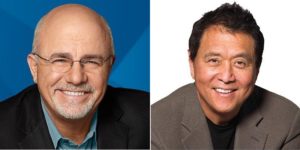In a response to my comment on someone else’s post, a reference was made to whether I was a follower of Dave Ramsey or Robert Kiyosaki. Obviously, most of us in the Desperately-Seeking-FIRE genre know: 1) who Dave Ramsey and Robert Kiyosaki are; and 2) that they have very different financial philosophies. For a long time, I could have answered in a split-second which of them I preferred. But is the answer quite so simple as that? It may not be anymore, at least for me.
Where’d that question come from, anyway?
The question was raised when I commented on the post “7 Smart Tips to Get Out of Student Loan Debt” by Dr. Breathe Easy Finance* and stated that I wished I had thought about that sort of thing two decades ago. (I made what, in retrospect, seems like a lot of dumb choices, financially, back then.) I happened to mention that the student loan balance we have remaining will be paid off in about 18 months, even with just the minimum monthly payments, and he responded, in part:
Pay every 2 weeks to finish it off quicker. Of course my only caveat is if the loan has low interest rate, you can invest instead. All depends if you are in Dave Ramsey[‘s] court or Kiyosaki[‘s].
In this corner…
Dave Ramsey, as I know all too well from having taken Financial Peace University twice, would have been on my case a long time ago for not having retired that student loan debt with “gazelle intensity”. He would probably tell me (and you) that all debt is bad. As far as I know, he lives debt-free, just as he preaches. (For more information on his philosophy, check out his book Financial Peace.)
Robert Kiyosaki is best known for his best-seller Rich Dad, Poor Dad: What the Rich Teach Their Kids About Money – That the Poor and Middle Class Do Not! He would probably say to me, just as he has said on his webpage, that thinking that all debt is bad is only right to a point. He states that there is good debt and bad debt. The bad debt is the one I have used most in my life to this point. But the good debt is money used to make more money. This would include taking on the debt of a mortgage to own a rental property, thereby making yourself more money using other people’s money (Mr. Kiyosaki capitalizes this phrase, which should tell you how important a concept he feels it is.)
I have known people who hung on every word one or the other of these two people would say. People I respected, mind you. Yet they couldn’t both be right, could they?

Two well-respected financial minds, two very different financial philosophies. Who is right? (Pics courtesy Twitter.)
The evolution of my philosophy
If you have asked me ten years ago if I followed Dave Ramsey or Robert Kiyosaki, I would have responded with Mr. Ramsey without a second thought. As I said, we took the Financial Peace course; we were working the Baby Steps; all was well, right?
Well, not exactly. If you know anything about the Baby Steps, you know that you only save $1000 in your emergency fund before throwing everything you can at your debt. Well, medical bills and a furnace replacement (it gets cold here, so that’s rather a necessity) went through way more than our emergency fund. In the meantime, we have built some equity in the house. Mr. Kiyosaki, and others, might suggest using some of that equity to make some more money, thereby increasing the cash flow and helping us pay some of these bills we’ve started to amass again.
But is using some of the equity in my house to invest a good idea? Doesn’t the Bible say “neither a borrower nor a lender be?”
No. No, it doesn’t. That’s from Hamlet. The Bible does say “the borrower is slave to the lender,” though. Mr. Ramsey likes to cite that verse.
So…what’s the verdict?
Well, the jury’s still out. I’m not keen on most debt, for sure, but the idea of using the equity in the house to earn some extra income holds some appeal for this working dad. Stay tuned.
How about you? Have you borrowed from your home equity? Did it pay off for you?
* Not his real name. I’m assuming here, but I feel pretty good about this assumption.
Note: this post probably contains affiliate links. View my affiliate link disclaimer here.
I think the fundamental difference between the two schools of thought is the risk tolerance. It’s not binary as individuals have varying levels of risk tolerance across the spectrum, but those closer to the Ramsey camp have lower risk tolerance than those in the Kiyosaki camp.
Personally I’m much closer to the Kiyosaki camp. I believe there is good and bad debt. I understand the philosophy of not wanting to have any debt, but I don’t understand how some think all debt is bad–I can only think that some just don’t understand the field finance. For example, we just went through a period of of extremely low interest rates, e.g., 30 year fixed mortgages at ~3.5%, 0% financing on other items. It’s pretty obvious that there are opportunities to borrow at lower costs than one can generate in returns (whether it’s in the markets, a small business, or even borrowing at 0% while buying short-term treasuries now at 2.5%).
At the same time I’m not taking out home equity loans and further leveraging my home as it’s where my family and I reside, and I don’t want to take on additional risk in that area. But I will continue to use good debt / leverage where possible when making capital allocation decisions.